Nissan Leaf vs Renault Arkana – Which car suits you better?
Both models have their strengths – but which one suits you more?
Compare performance, efficiency, price and space directly: Nissan Leaf or Renault Arkana?
Costs and Efficiency:
When it comes to price and running costs, the biggest differences usually appear. This is often where you see which car fits your budget better in the long run.
Renault Arkana has a slight advantage in terms of price – it starts at 28500 £, while the Nissan Leaf costs 30800 £. That’s a price difference of around 2314 £.
Engine and Performance:
Power, torque and acceleration say a lot about how a car feels on the road. This is where you see which model delivers more driving dynamics.
When it comes to engine power, the Nissan Leaf has a clearly perceptible edge – offering 217 HP compared to 143 HP. That’s roughly 74 HP more horsepower.
In acceleration from 0 to 100 km/h, the Nissan Leaf is clearly quicker – completing the sprint in 6.90 s, while the Renault Arkana takes 10.80 s. That’s about 3.90 s faster.
In terms of top speed, the Renault Arkana performs minimal better – reaching 172 km/h, while the Nissan Leaf tops out at 157 km/h. The difference is around 15 km/h.
There’s also a difference in torque: Nissan Leaf pulls noticeable stronger with 340 Nm compared to 205 Nm. That’s about 135 Nm difference.
Space and Everyday Use:
Whether family car or daily driver – which one offers more room, flexibility and comfort?
Both vehicles offer seating for 5 people.
In curb weight, Renault Arkana is minimal lighter – 1510 kg compared to 1580 kg. The difference is around 70 kg.
In terms of boot space, the Renault Arkana offers to a small extent more room – 480 L compared to 394 L. That’s a difference of about 86 L.
In maximum load capacity, the Renault Arkana performs noticeable better – up to 1263 L, which is about 473 L more than the Nissan Leaf.
When it comes to payload, Renault Arkana slight takes the win – 451 kg compared to 415 kg. That’s a difference of about 36 kg.
Who comes out on top?
Overall, the Nissan Leaf shows itself to be leaves the rival little chance and secures the title of DriveDuel Champion.
It convinces with the more balanced overall package and proves to be the more versatile choice for everyday use.
 @ Nissan Motor Corporation
@ Nissan Motor Corporation
Nissan Leaf
Nissan Leaf
The Nissan Leaf stands out as a pioneering model in the realm of electric vehicles, known for its impressive blend of practicality and eco-friendliness. It offers a smooth and quiet driving experience, making it an ideal choice for city commuting and longer journeys alike. The interior design is both comfortable and intuitive, providing drivers with a sense of modernity and ease of use.
details @ Nissan Motor Corporation
@ Nissan Motor Corporation
 @ Nissan Motor Corporation
@ Nissan Motor Corporation
 @ Nissan Motor Corporation
@ Nissan Motor Corporation
 @ Nissan Motor Corporation
@ Nissan Motor Corporation
Renault Arkana
The Arkana stands out with its striking coupe-SUV design, blending sporty aesthetics with practicality. Its bold silhouette and high ride height offer a unique presence on the road, attracting attention wherever it goes. Inside, the Arkana combines modern technology with comfort, making it a versatile choice for both city driving and weekend getaways.
details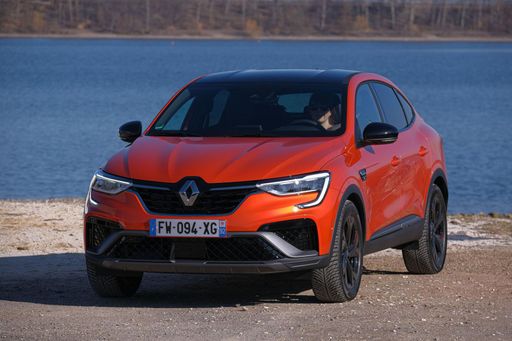 @ Renault Group Media
@ Renault Group Media
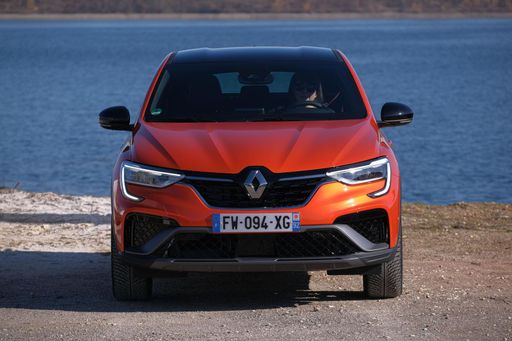 @ Renault Group Media
@ Renault Group Media
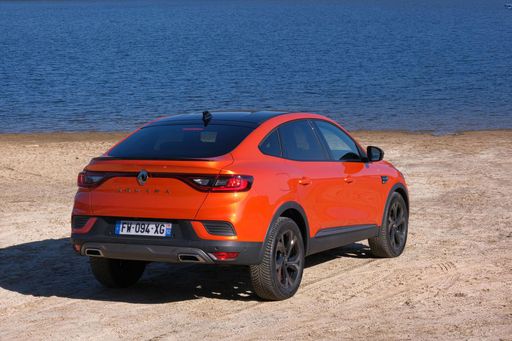 @ Renault Group Media
@ Renault Group Media
 @ Renault Group Media
@ Renault Group Media
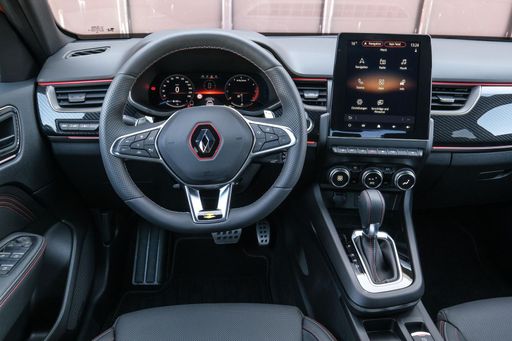 @ Renault Group Media
@ Renault Group Media
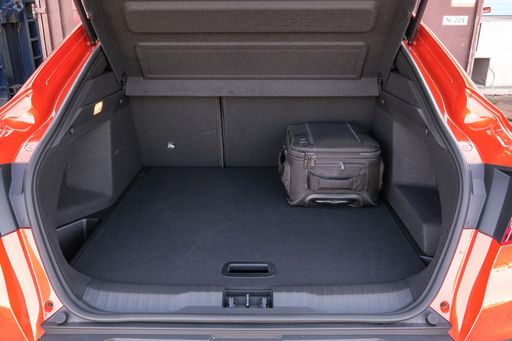 @ Renault Group Media
@ Renault Group Media
 @ Nissan Motor Corporation
@ Nissan Motor Corporation
|
 @ Renault Group Media
@ Renault Group Media
|
|
|
|
Costs and Consumption |
|
|---|---|
|
Price
30800 - 37200 £
|
Price
28500 - 31900 £
|
|
Consumption L/100km
-
|
Consumption L/100km
4.70 L
|
|
Consumption kWh/100km
16.7 - 17.8 kWh
|
Consumption kWh/100km
-
|
|
Electric Range
270 - 385 km
|
Electric Range
-
|
|
Battery Capacity
39 - 59 kWh
|
Battery Capacity
0.60 kWh
|
|
co2
0 g/km
|
co2
106 g/km
|
|
Fuel tank capacity
-
|
Fuel tank capacity
50 L
|
Dimensions and Body |
|
|---|---|
|
Body Type
Hatchback
|
Body Type
SUV
|
|
Seats
5
|
Seats
5
|
|
Doors
5
|
Doors
5
|
|
Curb weight
1580 - 1756 kg
|
Curb weight
1510 kg
|
|
Trunk capacity
385 - 394 L
|
Trunk capacity
480 L
|
|
Length
4490 mm
|
Length
4568 mm
|
|
Width
1788 mm
|
Width
1821 mm
|
|
Height
1540 - 1545 mm
|
Height
1576 mm
|
|
Max trunk capacity
790 L
|
Max trunk capacity
1263 L
|
|
Payload
384 - 415 kg
|
Payload
451 kg
|
Engine and Performance |
|
|---|---|
|
Engine Type
Electric
|
Engine Type
Full Hybrid
|
|
Transmission
Automatic
|
Transmission
Automatic
|
|
Transmission Detail
Reduction Gearbox
|
Transmission Detail
Automatic Gearbox
|
|
Drive Type
Front-Wheel Drive
|
Drive Type
Front-Wheel Drive
|
|
Power HP
150 - 217 HP
|
Power HP
143 HP
|
|
Acceleration 0-100km/h
6.9 - 7.9 s
|
Acceleration 0-100km/h
10.80 s
|
|
Max Speed
144 - 157 km/h
|
Max Speed
172 km/h
|
|
Torque
320 - 340 Nm
|
Torque
205 Nm
|
|
Number of Cylinders
-
|
Number of Cylinders
4
|
|
Power kW
110 - 160 kW
|
Power kW
105 kW
|
|
Engine capacity
-
|
Engine capacity
1598 cm3
|
General |
|
|---|---|
|
Model Year
2019
|
Model Year
2025
|
|
CO2 Efficiency Class
A
|
CO2 Efficiency Class
C
|
|
Brand
Nissan
|
Brand
Renault
|
What drivetrain options does the Nissan Leaf have?
Available configurations include Front-Wheel Drive.
The prices and data displayed are estimates based on German list prices and may vary by country. This information is not legally binding.
